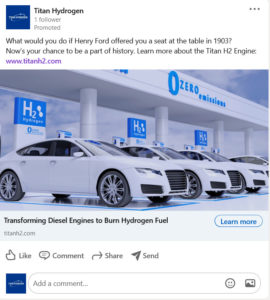Titan Hydrogen gears up for public listing with pre-IPO raise
Energy
Energy
Titan Hydrogen has launched a capital raising of up to $1m as it eyes a public listing in late 2021/early 2022.
Titan Hydrogen’s goal is to turn the hydrogen-fuelled vehicle sector on its head and ignite a speedier uptake of hydrogen for transport with its two-revenue stream approach.
The company is developing a hydrogen fuel cell system that is much more efficient and has significantly increased driving range, which makes hydrogen-powered vehicles much more cost effective to operate.
Titan is also close to commercialising a hydrogen injection system that will extend the life of existing internal combustion engine (ICE) vehicles, reduce their emissions by up to 30% and improve fuel consumption by up to 20%.

While most of the hydrogen industry is focused on reducing the price of hydrogen, Titan’s approach is to generate more energy from the same amount of hydrogen. This will lead to a substantial decrease in the cost of travel.
Currently, there are no hydrogen-fuelled trucks or buses in commercial use in Australia.
The Hydrogen Council estimates that hydrogen could be as cost competitive as conventional transport options by 2030.
For heavy-duty trucks and long-range segments in particular, fuel cell electric vehicles (FCEVs) are emerging as a complementary solution to battery electric vehicles (BEVs).
The Hydrogen Council believes FCEVs can achieve breakeven with diesel for heavy-duty long-haul transport by 2028 if hydrogen can be made available for $US4.50 per kilogram (including hydrogen production, distribution and refuelling station costs) at the pump.
By 2030, it is expected there will be around 4.5 million FCEVs on the road, with China, Japan and Korea leading the charge.
On the fuel cell front, the current low-temperature Polymer Electrolyte Membrane (PEM) fuel cells are not very efficient, according to Titan, typically converting less than 40% of the energy of the supplied hydrogen into electricity.
Buses and trucks require large quantities of hydrogen to achieve reasonable range, reducing the cost effectiveness of fuel cell powered vehicles.
Low conversion efficiency of fuel cells means that efficiency of using hydrogen to store electricity can be as low as 50% (compared to batteries at >90%).
This is where Titan has broken the mould, effectively doubling the driving range of a vehicle by enabling a fuel cell to produce more electricity from the same amount of hydrogen.
Titan says this reduces the cost to the consumer and eliminates the need for as many hydrogen refuelling stations, which can also be costly to build.
The company will begin proof of concept in Q3 2021, with the initial stage to be completed by the end of the year.
This article was developed in collaboration with Titan Hydrogen, a Stockhead advertiser at the time of publishing.
This article does not constitute financial product advice. You should consider obtaining independent advice before making any financial decisions.